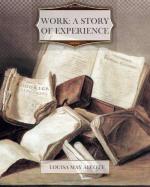Had Christie known that he came to see her she would have been ill at ease; but Mrs. Wilkins had kept her own counsel, so when Mr. Power turned to Christie, saying:
“My friend here tells me you want something to do. Would you like to help a Quaker lady with her housework, just out of town?”
She answered readily: “Yes, sir, any thing that is honest.”
“Not as a servant, exactly, but companion and helper. Mrs. Sterling is a dear old lady, and the place a pleasant little nest. It is good to be there, and I think you’ll say so if you go.”
“It sounds pleasant. When shall I go?”
Mr. Power smiled at her alacrity, but the longing look in her eyes explained it, for he saw at a glance that her place was not here.
“I will write at once and let you know how matters are settled. Then you shall try it, and if it is not what you want, we will find you something else. There’s plenty to do, and nothing pleasanter than to put the right pair of hands to the right task. Good-by; come and see me if the spirit moves, and don’t let go of Mrs. Wilkins till you lay hold of a better friend, if you can find one.”
Then he shook hands cordially, and went walking out again into the wild March weather as if he liked it.
“Were you afraid of him?” asked Mrs. Wilkins.
“I forgot all about it: he looked so kind and friendly. But I shouldn’t like to have those piercing eyes of his fixed on me long if I had any secret on my conscience,” answered Christie.
“You ain’t nothin’ to fear. He liked your way of speakin’ fust rate, I see that, and you’ll be all right now he’s took hold.”
“Do you know Mrs. Sterling?”
“Only by sight, but she’s a sweet appearin’ woman, and I wouldn’t ask nothin’ better ’n to see more of her,” said Mrs. Wilkins, warmly, fearing Christie’s heart might misgive her.
But it did not, and when a note came saying Mrs. Sterling would be ready for her the next week, she seemed quite content with every thing, for though the wages were not high she felt that country air and quiet were worth more to her just then than money, and that Wilkinses were better taken homceopathically.
The spirit did move her to go and see Mr. Power, but she could not make up her mind to pass that invisible barrier which stands between so many who could give one another genuine help if they only dared to ask it. But when Sunday came she went to church, eager for more, and thankful that she knew where to go for it.
This was a very different sermon from the other, and Christie felt as if he preached it for her alone. “Keep innocency and take heed to the thing that is right, for this will bring a man peace at the last,” might have been the text, and Mr. Power treated it as if he had known all the trials and temptations that made it hard to live up to.
Justice and righteous wrath possessed him before, now mercy and tenderest sympathy for those who faltered in well-doing, and the stern judge seemed changed to a pitiful father. But better than the pity was the wise counsel, the cheering words, and the devout surrender of the soul to its best instincts; its close communion with its Maker, unchilled by fear, untrammelled by the narrowness of sect or superstition, but full and free and natural as the breath of life.




